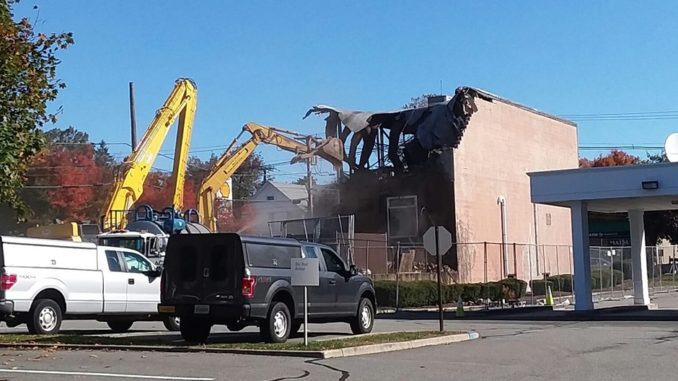
HILLSDALE—The state site remediation manager for the former Alexander Cleaners property at 127 Broadway said that contamination in underground aquifers there meets or is below state water quality standards, at the May 10 Borough Council meeting.
The site has been under state environmental remediation since 2019, when perchloroethylene was found in soil and groundwater plumes beneath the former Alexander Cleaners site. A two-story structure there was demolished and extensive soil excavation and groundwater remediation studies undertaken since then.
At the May 10 council meeting, state Department of Environmental Protection (NJDEP) Manager Kevin Langley told council members that low levels of contamination were found to be moving towards a nearby parking lot and will require further investigation and site design work.
In addition to Langley, three other NJDEP site remediation staff attended the meeting, including Shana Shepherd, community relations manager, Bill Buchanan, construction manager, and John Doyon, section chief. Shepherd advised officials to contact her with questions at (609) 292-1923 and via email.
Langley said this will likely take another five to six months from environmental consultant H2M Architects & Engineers to develop a groundwater protection plan. He said no drinking water wells were in the immediate area or affected.
Langley said over the last year, soil gas sampling, installation of three new monitoring wells, and the delineation of toxic plume movement south of the former Alexander’s Cleaners has been documented. He said once soil excavation is completed, the contaminated plume “will attenuate naturally…once the (toxic) source area is removed.”
Councilman Frank Pizzella said since the fenced-in site area is across from local businesses, and given the borough’s focus on downtown improvements, he asked DEP officials if they might better screen the site with green fence slats, calling the site “an eyesore.”
He told DEP officials that it is hard to attract local businesses “if the town looks shabby” referring to the fenced-in, vacant property. Doyon said green slats can be placed in the fencing and that DEP would get personnel to maintain the site including weeding and mowing.
Hoping to make the site more presentable, Pizzella requested DEP assistance. “We don’t know how long it’s going to take for the site to be cleaned. “(I’m) positive that it’s going to be a negative impact,” on downtown revitalization and redevelopment efforts, he said.
In November 2019, Pascack Press reported that the two-story office building at 137 Broadway, which replaced Alexander Cleaners, had recently been demolished and site remediation and studies would soon commence.
The DEP considers PCE a potential carcinogen, and it is regulated as a hazardous substance, said DEP spokesman Larry Hajna. Hajna said in July 2018 that the chemicals migrating beneath the former dry cleaner were not yet a public health concern and that the demolition and cleanup will initially be funded via a publicly funded cleanup supervised by NJDEP, with likely future actions against identified responsible parties.
According to NJDEP’s July 2018 “decision document” laying out a cleanup strategy, the first step was to demolish the existing structure to allow access to the “PCE source area or hotspot” to complete excavation using large augers.
“Upon completion of the demolition, further source area characterization, delineation and soil excavation activities will be performed,” notes the cleanup plan.
Soil will be excavated to a depth of 28 feet, followed by additional testing, and backfilled with flowable fill “such as a cement-like slurry” said NJDEP in 2019.
“Upon completion of soil excavation, the area will be backfilled to match existing site grade using certified clean fill. The area will then be paved with asphalt.
Additionally, post-remediation groundwater monitoring will be implemented,” noted NJDEP’s site remediation document.
In July 2018, NJDEP estimated implementation of its remedial action plan to cost $1,880,059, which included groundwater monitoring. No cost updates were provided during the NJDEP’s May 10 presentation.
